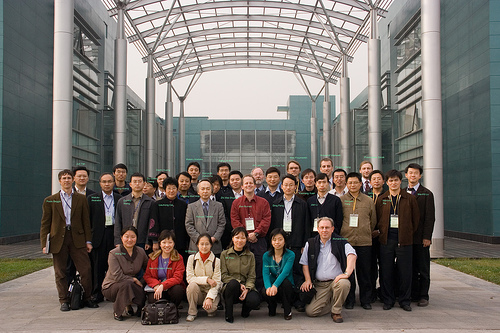
|
(Some presentations will contain content that is discussed in later sessions)
9:00-9:05 Welcome to the workshop by James Larson
9:05-9:20 Introduction to W3C by Max Froumentin [Slides]
9:20-9:35 SSML Background by Dan Burnett [Slides]
9:35-9:50 Pronunciation Lexicon Background by Paolo Baggia [Slides]
9:50-10:05 Internationalizing SSML by Kazuyuki Ashimura [Slides]
10:05-10:15 Question & Answer
10:15-10:35 Telekommunikacja Polska: An extension to the <say-as> element for diacritics auto-completion [Slides]
10:35-11:00 BREAK
11:00-11:20 Focused discussion: How to represent diacritics for auto-completion?
11:20-11:40 InfoQuick SinoVoice: An Introduction of S3ML [Slides]
11:40-12:00 Chinese U of Hong Kong: SSML Extensions for Chinese Voice Browsing [Slides]
12:00-12:30 Focused discussion: How to represent special word classes such as names, fractions, measure, net, percentage, ratio, etc.?
12:30-14:00 LUNCH
14:00-14:20 iFLYTEK: Overview of Chinese Speech Synthesis Markup Language [Slides]
14:20-14:40 IBM: Chinese Romanization for Chinese Voice Browsing [Slides]
14:40-15:00 Toshiba: Suggestions on Tone and Word Boundary of Mandarin for SSML [Slides]
15:00-15:30 BREAK
15:30-15:50 Panasonic: Position Paper of Panasonic Beijing Laboratory for W3C Workshop on Internationalizing the SSML [Slides]
15:50-16:20 Focused discussion: How to represent word boundaries?
16:20-16:40 JEITA: Issues of SSML in Japanese [Slides]
16:40-17:00 Korea Telecom & Information and Communications University : SSML Extension for Korean [Slides]
17:00-17:30 Focused discussion: How to denote language/dialects?
17:30-18:00 Focused discussion: What character sets should be used to represent Chinese, Japanese, Korean, etc.?
19:00 DINNER
9:00-9:10 Overview: Approaches for representing tones and tones sandhi by Helen Meng [Slides] and Jianhua Tao [Slides]
9:10-10:00 Focused discussion: How to represent tones and tones sandhi?
10:00-10:20 Chinese Academy of Sciences: The Concept of Speech Synthesis Markup Language [Slides]
10:20-11:00 Focused discussion: How to represent the structure of text using SSML?
11:00-11:30 BREAK
11:30-11:50 Korea Telecom: Usage of Pos for Resolving Multiple Pronunciations in SSML [Slides]
11:50-12:10 Focused discussion: How to represent a single word with different pronunciations and meanings?
12:10-12:30 Nokia: SSML Extensions Aimed To Improve Asian Languages TTS Rendering [Slides]
12:30-13:00 Focused discussion: How to deal with multiple languages in the same text?
13:00-14:20 LUNCH
14:20-14:40 Tsinghua University: Toward Synthesizing Expressive Mandarin Speech [Slides]
14:40-15:00 France Telecom: TOWARDS SYNTHESIS OF FOCUS IN MANDARIN TEXT-TO-SPEECH SYSTEM [Slides]
15:00-15:15 Focused Discussion: Should a <focus> element be added to SSML?
15:15-15:30 Focused Discussion: Should expressive elements be added to SSML?
15:30-15:45 Focused Discussion: Should elements for speaking style be added to SSML?
15:45-16:15 BREAK
16:15-17:15 Open discussion:
17:15-18:00 Discussion: What are the next steps?
The Call for Participation and the Participants List are available.
Jim Larson and Kazauyuki Ashimura, Workshop Co-chairs
Max Froumentin, Voice Activity Lead
$Id: ssml-workshop-agenda.html,v 1.30 2006/12/21 17:10:54 ashimura Exp $